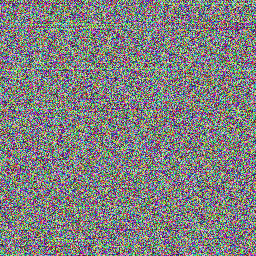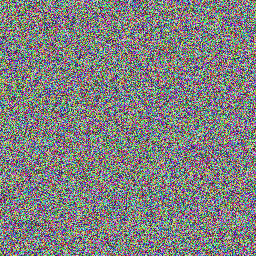A 64bit XorShift is now used to generate random numbers in DWScript, and there is a now a separate random number generator per-execution, which is auto-randomized when an execution is created.
Previously, the RTL random generator was used, this was “okay” when you had only one script using random numbers at a time, but multiple scripts running at the same time would interfere (Randomize calls would affect each others f.i.), and Random isn’t really thread-safe.
Performance fo XorShift is roughly comparable to the Delphi RTL’s linear congruential generator, but with much better statistical random properties and a very long period, without the overhead of a Mersenne Twister. For those interested in the mathematical details, see “XorShift RNGs” paper by G. Marsagalia.
As an illustration of the improved random properties, consider filling a bitmap with “random” RGB colors for each pixel:
var x, y : Integer;
for x := 0 to bmp.Width-1 do
for y := 0 to bmp.Height-1 do
bmp.Pixel[x, y] := RandomInt($1000000);
Using the Delphi built-in Random, you’ll get something like the image below (generated at 512×512, then halved and downgraded to 4bpp for web consumption)

Delphi RTL Random
Oooh… the horizontal scratch lines! Not so random after all… I don’t know if the Delphi LCG is as biased as RANDU, but visibly, it is probably not something you want to rely upon too much.
And now, the same but with the XorShift implementation now used in DWS:

DWScript XorShift Random
The XorShift implementation is very simple, fast, and doesn’t require much memory: a single 64bit value is enough to get good random, use two if you want longer periods that won’t have a chance to loop before the universe ends.
Last but not least, 64bit XorShift may be fast in 32bit binaries, but it practically walks on water in 64bit binaries 😉
 Time for some summer fun! Someone asked in the delphi win32 newsgroup how to prevent users from doing a “Print Screen”. The answer to that is that you can’t really, since screen capture can be invoked from other applications, or your app can be hosted in a Virtual Machine, accessed over RDP, or a frame can be grabbed directly from the screen cable.
Time for some summer fun! Someone asked in the delphi win32 newsgroup how to prevent users from doing a “Print Screen”. The answer to that is that you can’t really, since screen capture can be invoked from other applications, or your app can be hosted in a Virtual Machine, accessed over RDP, or a frame can be grabbed directly from the screen cable.
